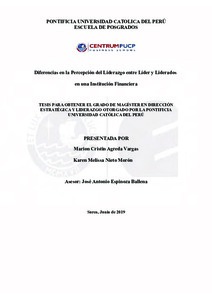| dc.contributor.advisor | Espinoza Ballena, José Antonio | |
| dc.contributor.author | Agreda Vargas, Marion Cristin | |
| dc.contributor.author | Nieto Morón, Karen Melissa | |
| dc.date.accessioned | 2019-10-04T17:25:19Z | |
| dc.date.available | 2019-10-04T17:25:19Z | |
| dc.date.created | 2019-06 | |
| dc.date.issued | 2019-10-04 | |
| dc.identifier.uri | http://hdl.handle.net/20.500.12404/15101 | |
| dc.description.abstract | Se desarrolló esta investigación con el objetivo general de conocer la percepción que
los liderados tienen del liderazgo de sus jefes y la auto percepción que los mismos líderes
tienen; para luego compararlas y encontrar si existen brechas. Esto dentro de una institución
financiera del Perú, utilizando la metodología de caso a través del modelo Leadership
Practice Inventory (LPI). Este modelo LPI consta de cinco dimensiones que fueron
estudiadas: (a) modelar el camino, (b) inspirar una visión compartida, (c) desafiar los
procesos, (d) empoderar, y (e) motivar a los empleados o alentar el corazón. La importancia
del presente estudio radica en que el tema del liderazgo se hace cada vez más complejo,
mientras que las diferencias en las percepciones pueden ser originadas por diferentes factores,
por lo que los líderes deben vigilar no solo el mensaje que transmiten, sino los medios que
utilizan y la manera cómo sus subordinados reciben el mensaje. La metodología diseñada fue
de carácter descriptivo y enfoque cualitativo, usando entrevistas a profundidad para recabar
información en tres oficinas, tanto de líderes como de liderados, procediendo luego a analizar
los datos con el software Atlas Ti y contrastar las respuestas obtenidas. Las conclusiones
revelan que no existen diferencias generales en la forma en que el líder y los liderados
perciben el liderazgo, ya que ambos consideran que la motivación, el empoderamiento y la
inspiración hacia una visión común son relevantes. En la manera de modelar el camino,
ambos grupos coinciden en que se logra indicando claramente las metas, brindando
capacitación y manteniendo reuniones de seguimiento; mientras que la inspiración se
transmite a través del ejemplo, por lo que el comportamiento de los líderes es importante y
debe ser acorde a los valores que profesan y a las metas organizacionales. Se recomienda
continuar con el empoderamiento del personal, a través del desarrollo de competencias y
promover el cumplimiento de metas claras, desarrollando el sentimiento de trabajo en equipo. | es_ES |
| dc.description.abstract | This research was developed with the general objective of knowing the perception
that the leaders have of their leaders’ leadership as well as leaders’ self perception; to
compare them and find the gaps. This is within a financial institution in Peru, using the case
methodology, applying the Leadership Practice Inventory (LPI) model. This LPI model
consists of five dimensions which were studied: (a) model the way, (b) inspire a shared
vision, (c) challenge the processes, (d) empower, and (e) motivate employees or encourage
the heart. The importance of this study is that the issue of leadership is becoming increasingly
complex, while differences in perceptions can be caused by different factors, so leaders must
monitor not only the message they convey, but the media they use and the way their
subordinates receive the message. The designed methodology was descriptive and qualitative
approach, using in-depth interviews to gather information in three offices, both leaders and
led, proceeding then to analyze the data with Atlas Ti software and contrast the answers
obtained. The conclusions reveal that there are no general differences in the way leaders and
leaders perceive leadership, since both consider that motivation, empowerment and
inspiration towards a common vision are relevant. In the way of modeling the road, both
groups agree that it is achieved by clearly indicating the goals, providing training and holding
follow-up meetings; While inspiration is transmitted through the example, so the behavior of
leaders is important and must be consistent with the values they profess and organizational
goals. It is recommended to continue with the empowerment of the personnel, through the
development of competences and to promote the fulfillment of clear goals, developing the
feeling of teamwork. | es_ES |
| dc.language.iso | spa | es_ES |
| dc.publisher | Pontificia Universidad Católica del Perú | es_ES |
| dc.rights | info:eu-repo/semantics/closedAccess | es_ES |
| dc.subject | Liderazgo--Investigaciones | es_ES |
| dc.subject | Comportamiento organizacional | es_ES |
| dc.subject | Instituciones financieras--Perú | es_ES |
| dc.title | Diferencias en la percepción del liderazgo entre líder y liderados en una institución financiera | es_ES |
| dc.type | info:eu-repo/semantics/masterThesis | es_ES |
| thesis.degree.name | Maestro en Dirección Estratégica y Liderazgo | es_ES |
| thesis.degree.level | Maestría | es_ES |
| thesis.degree.grantor | Pontificia Universidad Católica del Perú. CENTRUM | es_ES |
| thesis.degree.discipline | Dirección Estratégica y Liderazgo | es_ES |
| renati.advisor.dni | 09176718 | |
| renati.author.dni | 46124390 | |
| renati.author.dni | 41035559 | |
| renati.discipline | 419397 | es_ES |
| renati.level | https://purl.org/pe-repo/renati/level#maestro | es_ES |
| renati.type | https://purl.org/pe-repo/renati/type#tesis | es_ES |
| dc.publisher.country | PE | es_ES |
| dc.subject.ocde | https://purl.org/pe-repo/ocde/ford#5.02.04 | es_ES |





